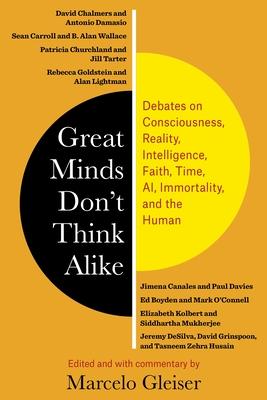Does technology change who we are, and if so, in what ways? Can humanity transcend physical bodies and spaces? Will AI and genetic engineering help us reach new heights or will they unleash dystopias? How do we face mortality, our own and that of our warming planet? Questions like these--which are only growing more urgent--can be answered only by drawing on different kinds of knowledge and ways of knowing. They challenge us to bridge the divide between the sciences and the humanities and bring together perspectives that are too often kept apart.
Great Minds Don't Think Alike presents conversations among leading scientists, philosophers, historians, and public intellectuals that exemplify openness to diverse viewpoints and the productive exchange of ideas. Pulitzer and Templeton Prize winners, MacArthur "genius" grant awardees, and other acclaimed writers and thinkers debate the big questions: who we are, the nature of reality, science and religion, consciousness and materialism, and the mysteries of time. In so doing, they also inquire into how uniting experts from different areas of study to consider these topics might help us address the existential risks we face today. Convened and moderated by the physicist and author Marcelo Gleiser, these public dialogues model constructive engagement between the sciences and the humanities--and show why intellectual cooperation is necessary to shape our collective future. Contributors include David Chalmers and Antonio Damasio; Sean Carroll and B. Alan Wallace; Patricia Churchland and Jill Tarter; Rebecca Goldstein and Alan Lightman; Jimena Canales and Paul Davies; Ed Boyden and Mark O'Connell; Elizabeth Kolbert and Siddhartha Mukherjee; Jeremy DeSilva, David Grinspoon, and Tasneem Zehra Husain.
Book
Great Minds Don't Think Alike: Debates on Consciousness, Reality, Intelligence, Faith, Time, Ai, Immortality, and the Human
(Write a Review)
Paperback
$19.95
Does technology change who we are, and if so, in what ways? Can humanity transcend physical bodies and spaces? Will AI and genetic engineering help us reach new heights or will they unleash dystopias? How do we face mortality, our own and that of our warming planet? Questions like these--which are only growing more urgent--can be answered only by drawing on different kinds of knowledge and ways of knowing. They challenge us to bridge the divide between the sciences and the humanities and bring together perspectives that are too often kept apart.
Great Minds Don't Think Alike presents conversations among leading scientists, philosophers, historians, and public intellectuals that exemplify openness to diverse viewpoints and the productive exchange of ideas. Pulitzer and Templeton Prize winners, MacArthur "genius" grant awardees, and other acclaimed writers and thinkers debate the big questions: who we are, the nature of reality, science and religion, consciousness and materialism, and the mysteries of time. In so doing, they also inquire into how uniting experts from different areas of study to consider these topics might help us address the existential risks we face today. Convened and moderated by the physicist and author Marcelo Gleiser, these public dialogues model constructive engagement between the sciences and the humanities--and show why intellectual cooperation is necessary to shape our collective future. Contributors include David Chalmers and Antonio Damasio; Sean Carroll and B. Alan Wallace; Patricia Churchland and Jill Tarter; Rebecca Goldstein and Alan Lightman; Jimena Canales and Paul Davies; Ed Boyden and Mark O'Connell; Elizabeth Kolbert and Siddhartha Mukherjee; Jeremy DeSilva, David Grinspoon, and Tasneem Zehra Husain.Paperback
$19.95